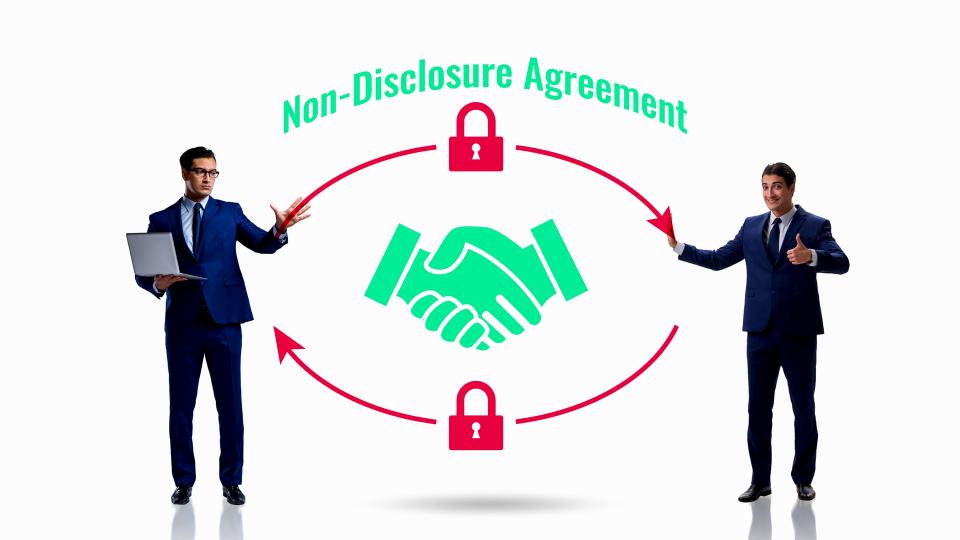.
It is not new that information and certain sets of data can be of immense value to those who have access to them and, therefore, being surrounded by different types of care is essential.
Among all that is up to a company to protect the information that generates value for it, is the confidentiality term.
What it is, when or in which situations to have one and why it is important, is what we will answer in today’s content.
What is a confidentiality agreement?
A non-disclosure agreement is basically a contract, in which the information on which secrecy / secrecy must exist and therefore confidentiality is established, as well as which party(s) is responsible for keeping it secret.
In other words, by signing such a contract, the parties agree to protect information that is considered confidential and that is shared with them by the other party. In addition to not disclosing or releasing information without consent, the party that has access to information considered sensitive also agrees not to copy, modify or use the information in any way that is not authorized by the person providing the information.
Confidentiality terms began to be signed and became commonplace, precisely when companies realized how valuable some information can be and that in certain situations, more than mutual trust, an instrument was needed that would give them certain guarantees regarding maintaining the secrecy of such information.
It could even be said that this is also one of the many instruments to combat data leakage, since there are cases in which they are deliberate.
Although it is usually known as a non-disclosure agreement, occasionally it can also be referred to as a confidentiality agreement or non-disclosure agreement, or its equivalent in English and which is non-disclosure agreement (or its acronym NDA), for contracts of international scope.
The name does not matter, but what is intended with the term, since data and information produced or used within an organization are not always protected by industrial property laws, or by legislation on copyright, or even by the intellectual property of computer programs, to name just the most common situations.
Even if some information is protected or surrounded by some legal guarantees, as in the case of a patent registration, a confidentiality term can extend what the registration does not cover, such as the period during which the information must remain secret.
What types of confidentiality terms?
Confidentiality contracts can be mutual / bilateral, unilateral or multilateral, depending on the object of protection, the situation in which the information is shared and the parties involved.
- Mutual or bilateral term – is entered into when both parties mutually share data and information considered confidential. That is, there is a reciprocal obligation to maintain confidentiality;
- Unilateral term – when only one of the parties has the interest or need to protect the information provided to the other party;
- Multilateral term – when the parties involved undertake the duty of confidentiality to different degrees or when there are more than two parties involved.
When is it important to sign a non-disclosure agreement?
There are a number of situations in which it is important to draw up and sign a non-disclosure agreement.
Below we will list the most common ones, however, eventually there may be other situations in which it is indicated to sign an NDA with the other party involved.
1. Collaborators
When performing their duties, it is not uncommon for an employee to have access to information of a strategic nature, industrial secrets, sensitive data, among others whose confidentiality needs to be guaranteed.
In cases where there is access and manipulation of data from third parties, establishing a confidentiality term is one of the instruments that guarantees that the company fully complies with the LGPD, for example.
It is also necessary to be concerned with higher hierarchical levels, as in the case of managers, a situation in which the amount and variety of information of this nature can be even greater.
The nondisclosure agreement must provide that they do not share what is the target of the term, both during the time they work for the company, as well as after leaving it.
2. Partners
Partnerships between companies often require that proprietary information and data be shared with the partner.
Although the companies involved are expected to act ethically and committed to the success of the other party, it is always convenient to enter into such a contract.
3. Clients
There are situations in which customers can also have access to information that should be restricted to the scenario of the commercial relationship, when, for example, a know-how or method is transferred to the customer and at the same time is part of their market differential.
In such cases, the provision of the service may be subject to the acceptance of a confidentiality agreement.
4. Suppliers
The provision of products and services sometimes requires suppliers to have access to sensitive information and this could be a component of a device using a unique technology, or a Marketing campaign relating to the launch of a new product.
It is common for certain suppliers to even participate in certain stages of product development, especially when their role is to deliver a special component or raw material, a common condition in innovative launches. Think of launching a new car model, which makes use of numerous third-party parts.
For all these situations, a term is needed.
5. Mergers / Acquisitions
Merger or acquisition processes, among many procedures and procedures, involve sharing sensitive financial and operational information, not only with the organization involved, but also with intermediaries, financial institutions, etc.
This is a typical example of a multilateral NDA, as a way of guaranteeing that data is protected, both in the case of consolidation of the operation or not, when the company that would be incorporated continues its trajectory.
6. Investors
When a company or even an individual investor is interested in a company, it is not necessary to know absolutely everything about it, but eventually some strategic information, which usually constitutes its differential, ends up being known by them and the maintenance of these differentials must be guaranteed by a confidentiality agreement.
7. Franchisees
Franchises are another common example of the institution of nondisclosure agreements.
This is because the franchisee has access to a large number of information, processes and procedures that can integrate the set of strategic differentials of the franchise.
8. Outsourced and service providers
There are commercial relationships that keep certain particularities and that generally have outsourced companies and some service providers as representatives, such as company consultancies.
In the case of the former, due to the constant presence of their employees in the client’s offices and in the case of the latter, due to the nature of their work, which involves knowledge of a large volume of sensitive information.
It is essential in both cases that at least part of the service provision contract is dedicated to the confidentiality agreement.
How to draw up a confidentiality agreement?
This is one of the most frequently asked questions by anyone who sees the need to draw up a non-disclosure agreement. However, contrary to what many similar contents do, we will not list which concerns must be observed, nor which elements must be included in such a document.
Why?
In Law, this is one of the areas that requires a high level of specialization, to the point that there are professionals dedicated exclusively to this subject, including some of the best paid in the profession, given the importance that the subject has.
In certain sectors and depending on what it involves, the difference between a well-designed contract and one that is not, often means business continuity or its end.
In Brazil, it is even relatively common, that in the worst possible situation, that is, when it is necessary to enforce the non-disclosure agreement, that one does not appeal to the judiciary. For no other reason than the fact that sometimes the case involves high technical complexity, requiring reports, analyses, tests and that, however well done and detailed they may be, some judges declare themselves incompetent to decide.
In situations like these, instead, decisions are taken by an arbitration chamber or commission, made up of specialists in the field and who are designated by common agreement between the parties involved.
Another reason to justify seeking legal advice specialized in contracts is that the variety of situations and particularities is incompatible with trying to place the reality of a company in a previous model, as there are many sites that provide them.
Imagine that your business has to enter into non-disclosure agreements with each of the eight entities we mentioned earlier. Is it really that a single model is enough to contemplate all eight situations and all their possible consequences? Or even if a financial employee and an IT employee must sign the same term?
Conclusion
The importance of some information used in the daily life of many companies makes it inevitable that they are guaranteed by terms of confidentiality.
.









